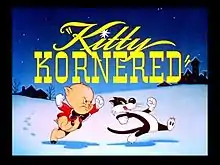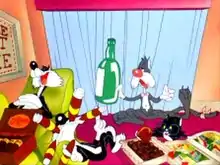Kitty Kornered
Kitty Kornered is a 1946 Warner Bros. Looney Tunes cartoon, directed by Robert Clampett.[2] The short was released on June 8, 1946, and stars Porky Pig and Sylvester.[3]
| Kitty Kornered | |
|---|---|
 | |
| Directed by | Robert Clampett |
| Produced by | Edward Selzer (uncredited) |
| Story by | Robert Clampett (uncredited)[1] |
| Starring | Mel Blanc |
| Music by | Musical Direction: Carl W. Stalling Orchestration: Milt Franklyn (uncredited) |
| Edited by | Treg Brown (uncredited) |
| Animation by |
|
| Layouts by | Thomas McKimson |
| Backgrounds by | Dorcy Howard |
| Color process | Technicolor |
Production company | |
| Distributed by | Warner Bros. Pictures |
Release date |
|
Running time | 7:06 |
| Language | English |
This is the first Looney Tunes cartoon to have the red and blue rings as well as the written out "That's all Folks!" at the closing rings, but in this cartoon, the Merrie Melodies music is heard at the end.
Porky and Sylvester would later be paired in a trio of shorts directed by Chuck Jones: Scaredy Cat, Claws for Alarm, and Jumpin' Jupiter. Both also appeared (with Daffy Duck) in The Scarlet Pumpernickel as the villain roles (the only time Sylvester spoke in a Chuck Jones-directed cartoon).
Plot
The neighborhood's cat owners all (literally) throw their cats out for the night. Porky Pig attempts to do the same, but his four cats (a tall black and white lisping cat (Sylvester), a medium-sized tabby named Gerald, a diminutive kitten named Pedro, and a dumb drunkard cat named Jose) attempt to turn the tables and throw him out into the snow. Porky states that he's starting to hate pussycats. Porky bangs on the door, demanding to be let in, but the cats pop out of the door and proclaim in unison, "Milkman, keep those bottles quiet!", and then slam the door in his face which soon leads to a battle between Porky and his cats for the house.
While the cats are lounging around, Porky bursts through the window, making an incredibly menacing face. He chases them around the house until one of them throws him into a cabinet full of dishes and a teapot. Porky retaliates by setting his pet dog "Lassie" on the cats. The cats see the dog's shadow and run for their lives, not knowing that "Lassie" is for real only a shadow puppet created with Porky's fingers and he doesn't for real have a dog.
When Sylvester finds out that they've been tricked, he and the others plot revenge, which is exacted by having the cats create a War of the Worlds-esque sensation about invading aliens, disguising themselves as the aliens and driving Porky into a panic over "Men from Mars!". Porky gets frightened and tries to shoot them with a gun but the cats, now dressed like Teddy Roosevelt, charge at Porky with swords and run him out of the house once and for all and winning the battle. Homeless, alone, and cold in the snow, Porky turns to the camera and asks the audience if they have a vacancy for a house.
Reception
Comics historian Craig Yoe writes, "In this uproariously funny film written by director Robert Clampett himself, everything and everyone is made of rubber. The last half has some of the most exhilirating action ever put on film."[4]
Cultural references
"Milkman, Keep Those Bottles Quiet" was a World War II hit song by Ella Mae Morse, and was sung by Nancy Walker in the movie Broadway Rhythm.
The wine that the grey drunken cat was drinking says "Arsenic and Old Grapes" is a parody reference to Arsenic and Old Lace.
On The Sylvester & Tweety Mysteries, the "Men from Mars" characters made an appearance in "Spaced Out."
The cats charging at Porky assume the appearances of Theodore Roosevelt and his Rough Riders cavalry (in reference to the then-popular film Arsenic and Old Lace).
References
- Beck, Jerry (1991). I Tawt I Taw a Puddy Tat: Fifty Years of Sylvester and Tweety. New York: Henry Holt and Co. p. 89. ISBN 0-8050-1644-9.
- Beck, Jerry; Friedwald, Will (1989). Looney Tunes and Merrie Melodies: A Complete Illustrated Guide to the Warner Bros. Cartoons. Henry Holt and Co. p. 167. ISBN 0-8050-0894-2.
- Lenburg, Jeff (1999). The Encyclopedia of Animated Cartoons. Checkmark Books. pp. 124–126. ISBN 0-8160-3831-7. Retrieved June 6, 2020.
- Beck, Jerry, ed. (2020). The 100 Greatest Looney Tunes Cartoons. Insight Editions. p. 111. ISBN 978-1-64722-137-9.
External links
 Quotations related to Kitty Kornered at Wikiquote
Quotations related to Kitty Kornered at Wikiquote- Kitty Kornered at IMDb
- Kitty Kornered at The Big Cartoon DataBase
